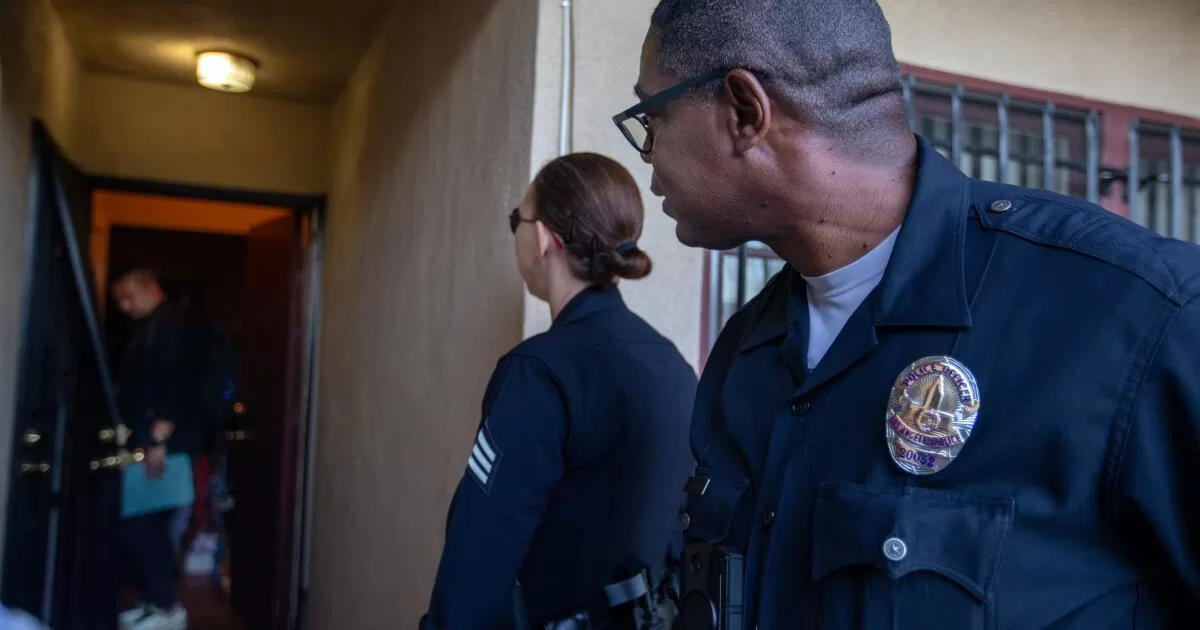Modeled after a heralded program out of Oregon, city officials said the so-called Unarmed Model of Crisis Response has two teams of mental health practitioners available 24 hours a day, seven days a week, for situations that would typically fall to police, such as conducting welfare checks and responding to calls for public intoxication and indecent exposure.
The program, run by the city attorney’s office, is so far operating in three police divisions — Devonshire, Wilshire and Southeast — with plans to evaluate its performance after a year and potentially expand.
City officials unveiled the initiative at a news conference earlier this week, after the program had been up and running for at least a month.
“From welfare check-ins, to nonviolent mental health/drug issues, to minor health crises in encampments and elsewhere, we need more tools in our toolbox to truly help Angelenos in need,” City Councilmember Bob Blumenfield said in a statement. “We can’t keep asking our police officers to also be social workers, mental health clinicians and outreach workers.”
The program is based on the “Cahoots” model, named for a Eugene, Ore., nonprofit widely considered the gold standard in mobile crisis intervention. The program, started in 1989, today handles about 20% of the mental health calls for the city of around 180,000 by dispatching teams of specialists trained in counseling and de-escalation.
The program’s launch in L.A. comes amid continued public frustration with the city’s handling of the intertwined issues of homelessness, substance abuse and mental health. The LAPD has come under heightened scrutiny after a string of mental health-related shootings and other use-of-force incidents. In 2023 alone, LAPD officers opened fire at least 19 times on people experiencing some form of behavioral crisis, according to a Times database.
Department officials have said repeatedly that, despite increased crisis intervention training and new “less-lethal” weapons designed to incapacitate rather than kill, officers are not always equipped to handle most mental health calls. At the same time, police say, these types of calls have the potential to quickly spiral into violence.
LAPD interim Chief Dominic Choi said during a meeting of the Los Angeles Board of Police Commissioners that the department “fully supports” the new program.
“It’s taking some of the workload from us and shifting the resources to the appropriate” responders, Choi said.
He said 911 personnel have been trained to divert calls to the program when there are no weapons or threats of violence mentioned.
Similar programs have been around for years, with new efforts springing up since 2020, spurred by a nationwide movement to redirect law enforcement funding following the murder of George Floyd by police in Minneapolis.
Los Angeles was among the major U.S. cities that pledged to develop and invest in new emergency responses that use trained specialists to render aid to homeless people and those suffering from mental health and substance abuse issues.
Some initiatives have struggled to bring crisis intervention alternatives to scale. Earlier this year, the Los Angeles Fire Department recommended ending a pilot program after officials said it didn’t actually free up first responders and hospital emergency rooms.
The Fire Department’s program launched in the fall of 2021 and has cost nearly $4 million. It operated vans staffed with psychiatric mobile response teams that included a psychiatric technician, a peer support specialist and a driver experienced in transporting patients to and from health and mental health facilities.
In New York, officials cited staffing and training issues as reasons why a Cahoots-style pilot fell short of its goal of rerouting at least 50% of mental health calls away from police.
Activists argue that such efforts remain woefully underfunded and, in same cases, are still too closely aligned with law enforcement.
Too often, city officials have undermined such alternative programs by making poor hiring choices, said Eddie Anderson, a pastor at McCarty Memorial Christian Church in Jefferson Park and a recent City Council candidate. He also questioned whether officials would continue to back the effort, given the city’s lingering budget woes.
“We’re really good around funding pilot programs, but not really good at accountability measures and sustainability measures around implementation,” Anderson said.
